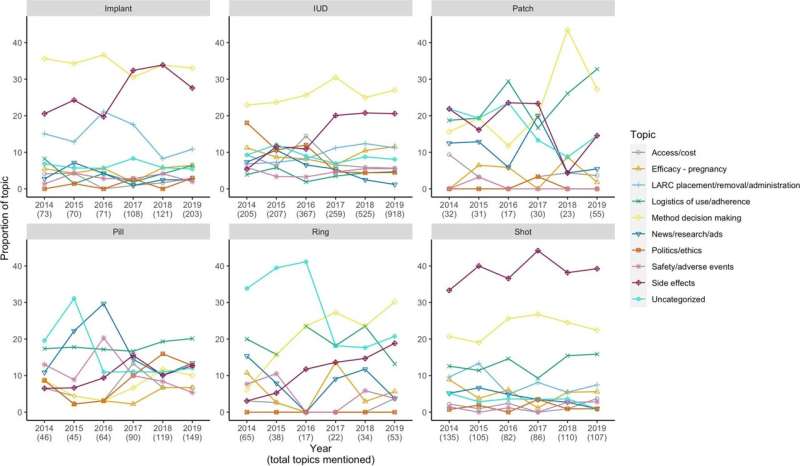This article has been reviewed according to Science X's editorial process and policies. Editors have highlighted the following attributes while ensuring the content's credibility:
fact-checked
trusted source
proofread
Study finds patients often consult Twitter for birth control guidance

Brigham researchers looked at tweets from 2014 to 2019 about contraceptive methods and found that only a small fraction were authored by health professionals
Patients are quick to turn to social media for guidance on contraception methods, side effects, and education, but what kind of content is being shared and who is sharing it? A new study conducted by researchers at Brigham and Women's Hospital, a founding member of the Mass General Brigham health care system, looked at thousands of tweets about reversible contraceptive methods published from 2014 to 2019.
Tweets were frequently posted by contraceptive consumers (about 50 percent), with a much smaller proportion (6 percent) posted by an official news or health care source. The findings point to opportunities for health care professionals to use social media to disseminate accurate contraceptive information. Results are published in Contraception and Reproductive Medicine.
"Platforms like Twitter, now known as X, empower patients to access health information and make decisions about contraception that align with their values," said Deborah Bartz, MD, MPH, an associate professor of medicine at Harvard Medical School and an attending physician in the Department of Obstetrics and Gynecology at BWH.
"We see that individuals are making decisions about contraception based on anecdotal experience and advice from friends, family, and social media users. So how can we, as physicians, use social media to lead to better health encounters and ultimately better health outcomes?"
Following up on a previous study in which the team analyzed tweets from 2006 (the year Twitter was founded) until 2019, researchers selected a random sample of one percent, or 4,434 out of the 457, 369 publicly available English-language tweets related to reversible prescription contraception methods posted between January 2014 and December 2019.
The team sorted tweets by contraception method and topics, including categories like efficacy, access, and safety. Two researchers coded tweets by theme, source (health professional, news source, consumer), and those seeing information versus providing advice, and a third individual resolved any discrepancies from the initial coding analysis.
They found that 26.7% of tweets discussed contraception method decision-making, and 20.5% covered side effects, particularly for intrauterine devices (IUDs) and the depot medroxyprogesterone acetate shot. Roughly 6% of tweets requested more information on contraception, and about 4% asked for advice. IUDs were the most frequently discussed long-term contraceptive method on the platform.
Notably, roughly half (50.6%) of tweets were posted by contraceptive consumers, while six percent were posted by official news or health care sources. Researchers also found that journalists and news sources authored significantly more tweets than health care professionals.
Health professionals on Twitter were also more likely to post educational content than other user demographics the team studied. Twitter users often reported making a decision about birth control based on information from a non-clinical source, such as friends, family, or social media.
All posts analyzed in this study were sorted and coded by individuals, leaving room for interpretation as to what content category they fall into (for example, side effects versus decision-making). Because the team only analyzed English-language tweets, these findings may not encompass non-English-speaking populations' perceptions of contraception. While authors took inventory of the type of content Twitter users discussed, they did not evaluate posts for accuracy, something Bartz aims to do in future work.
Bartz explained health professionals cannot ignore the information and misconceptions present on social media and should ask their patients about what education they already have on contraception in clinical discussions. She emphasized that a key takeaway from this study is that social media users want to hear from health professionals online.
"I would love to work with health care professionals on how to craft effective messaging about contraception and deliver those messages via social media to reach as many patients as possible," said Bartz. "We know that educational content shared by health professionals is well-received by users. Overwhelmingly, we see that people want to hear from medical professionals on social media."
More information: Melody Huang et al, Contraceptive content shared on social media: an analysis of Twitter, Contraception and Reproductive Medicine (2024). DOI: 10.1186/s40834-024-00262-2



















